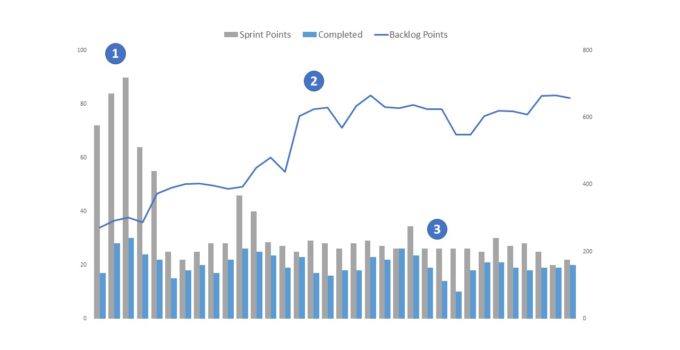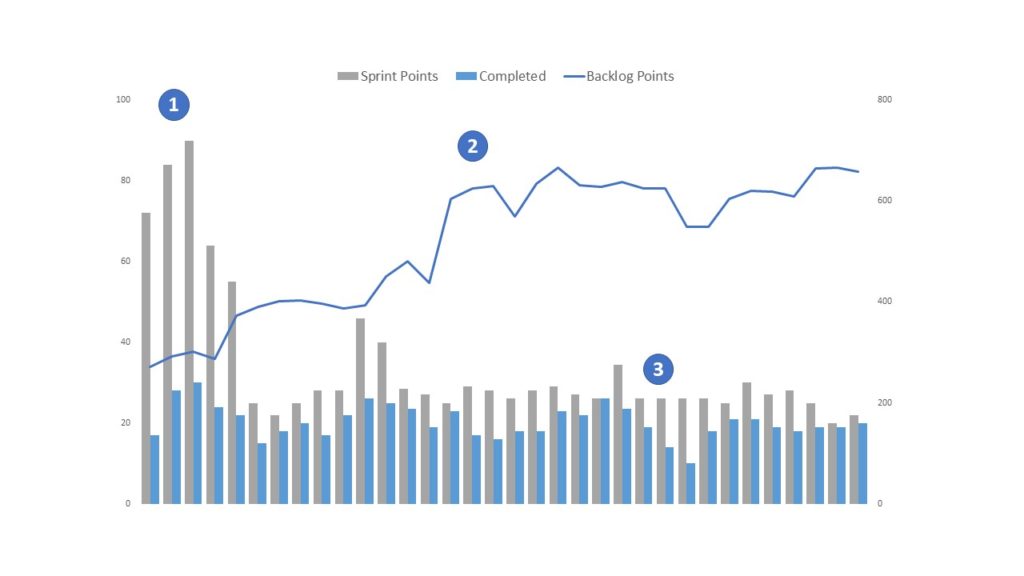Fun fact: I’ve been using my personal scrum system for a whole year now! My first recorded retrospective on my sprint tracker was on December 11. So, like any good system-builder, I’m going to take some time and reflect on a year using personal scrum.
What was the goal?
The initial goal of using scrum in my personal life was twofold. First, I was finding myself consistently overwhelmed in my daily life. I was job hunting, but also had a massive list of things I’d like to do. So on a daily basis, I would get overwhelmed trying to prioritize the list and end up doing nothing.
The second goal was to…use scrum. I had a job coach at the time to help me identify any blind spots I had in the job search, since I was in a new country. He suggested I get a Product Owner certification to help with roles in tech. I loved the idea of scrum, but didn’t have a professional setting to put it to use. So I just applied it to my own life.
I also tracked it! Here’s some data. I’ve tracked points, which I define as approximately 1 hour’s worth of work, but I use a Fibonacci scale, so it’s not an exact definition.
Notes:
- At the outset, I had outsized expectations for my weekly productivity. Realism set in, and now I routinely take on slightly more points than I complete.
- Over time, my backlog became more comprehensive. And no matter what I finish, it stays the same length. I can always come up with more goals.
- At the beginning of the COVID-19 quarantine, I took a break from scrum, after a few weeks of reduced productivity. No regrets.
What’s worked
I’ve already written about four things that scrum did for my life, but I initially wrote that after a couple months of using it. Now, with a full year under my belt, I can appreciate three big things:
Prioritization
I can honestly say that using scrum has reduced overwhelm in my life. It’s true that I have a lot of time to dedicate to my personal projects, but the number of personal projects easily outstrips the time. When I add something to my backlog, it’s enough to let my brain let it go. Then, if I later decide to remove it from the list, it’s not because I’m frustrated, but rather that I’ve moved on from the idea.
I’m not sure if this is a Katherine Problem (TM), but it’s the biggest benefit I’ve gotten from using scrum in my personal life.
Small bursts of motivation for large projects
Many of the things on my backlog are huge projects, like learning to draw or writing a blog. (Yes, I’m writing a blog, but there’s so much I want to do with it that it lives as a constant item on my backlog) And using scrum, I break off reasonable chunks every week and give myself the opportunity to see progress.
Anthony Trollope (19th century British author) was famous for creating small, digestible goals to achieve massive amounts of work. Every day, he would write from 5:30-8:30am before leaving for his normal 9-5 for the post office. During those three hours, he would write 250 words every 15 minutes, keeping a watch on his desk to keep track. At that rate, he wrote 49 novels in 35 years.
I likely won’t get THAT much done, but by taking the time to pull reasonable chunks out of my big goals, I actually get stuff done eventually.
Calibrating how much time I have in a day
I am an eternal time optimist. My husband will ask me what I want to do that day, and when I’m done listing my goals, he’ll raise his eyebrows at me. Because he knows how much I can reasonably get done. But I sure don’t.
After a year of using scrum, though, I’m getting better. I still have to sit down and reason out how long each thing will take me. And I’ll never stop overcommitting myself. But at least now, I’m closer to being reasonable in what I take on. And I’ve banished the overwhelm simply by reducing my options to what’s on my sprint for the week.
What it hasn’t fixed
One thing that my year of scrum hasn’t fixed is the guilt I associate with unfinished tasks. This is an ongoing struggle that I have, so it’s not surprising that it didn’t just go away. But I think it’s important to note that I have days where I don’t get anything done and I feel guilty about it. I also have days where I get a lot done – but not as much as I thought I would – and I feel guilty.
But I think that using scrum has killed off my trepidation of not getting anything done. Now I just need to tackle the doom feelings that come when I don’t get ~*everything*~ done. Cuz like….I’ll never get everything done.
Links!
I actually documented my system-building on my old website. I was initially going to link them all here, but it’s a loooong list (weekly check-ins for like 5 months). So check them out here if you’re interested:




